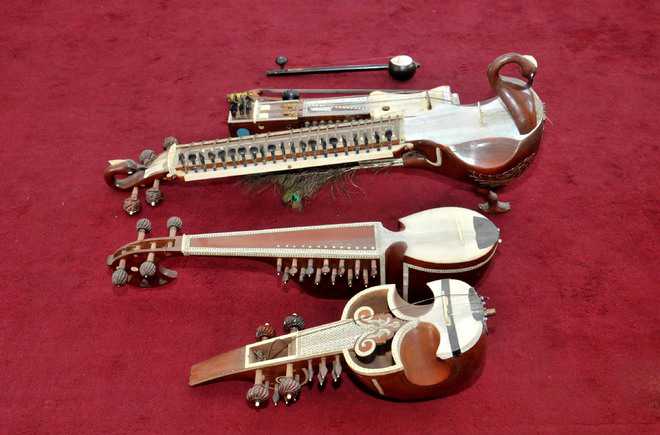
Musical instruments like taus, rabab, souanda, sarangi, gaj, banjo and tumbi are on the verge of extinction in the state. tribune photos
Aakanksha N Bhardwaj
Tribune News Service
Jalandhar, June 20
In the narrow lanes of Kot Kishan Chand, a banjo-manufacturing ‘Gyan Singh and Company’ exists. The company is still renowned for the works it has done since its inception in 1948, but a visit to the unit reveals a different picture. The owner of the unit, Davinder Singh (60) whose grandfather had started the firm, says that banjo would not help them for survival in the long run.
“We are the only unit left in Jalandhar which manufactures banjo and we have only two workers,” said Singh. While pointing at the workers, Dara Singh and Gyan Chand, the owner said with pride, “They are the only ones left who know how to make banjo. The art of making banjo will go with them as no one else knows about it,” he said. In Japanese, the instrument is called ‘taisokoto’. The Indian version of the instrument i.e harmonium banjo was first developed in the country by Davinder’s grandfather Gyan Singh, he claims. Making banjo is totally a manual work which requires precision. “We used to sell dozens of banjos daily, but now we hardly get any order from other states,” he said. When asked if any demand from banjo comes from Punjab, he said, “No, the things are not same as before.” The banjo was also used in qawwali.
The same has happened with other instruments like taus and rabab. Another important instrument which needs a special mention on International Music Day is tumbi. Gone are the days when Punjabis would get to listen to tumbi, Punjab’s own instrument. Songs of Yamla Jatt, Kuldeep Manak among other Punjabi folk singers would have been incomplete without a tumbi.
Now, things have totally changed, youngsters do not even know about the instrument. The instrument seems on a verge of extinction. Its manufacturing hubs are rare to be seen. Shop owners selling musical instruments say nobody buys tumbi these days. “Only NRIs buy the instrument that too just to let their children know that the instrument had a great contribution to the Punjabi culture,” said Ram Prasad, a seller of music instruments in the city.



























